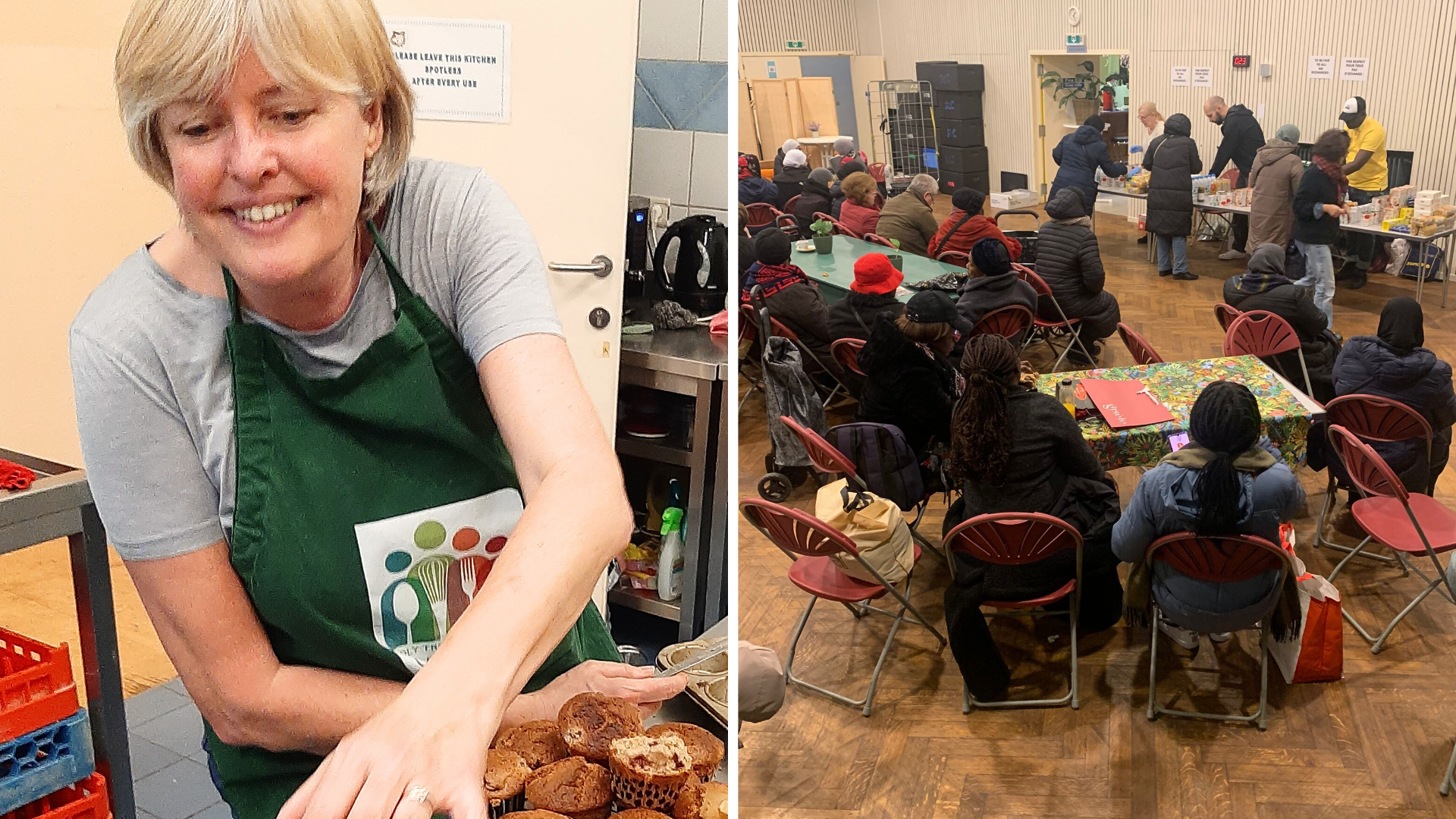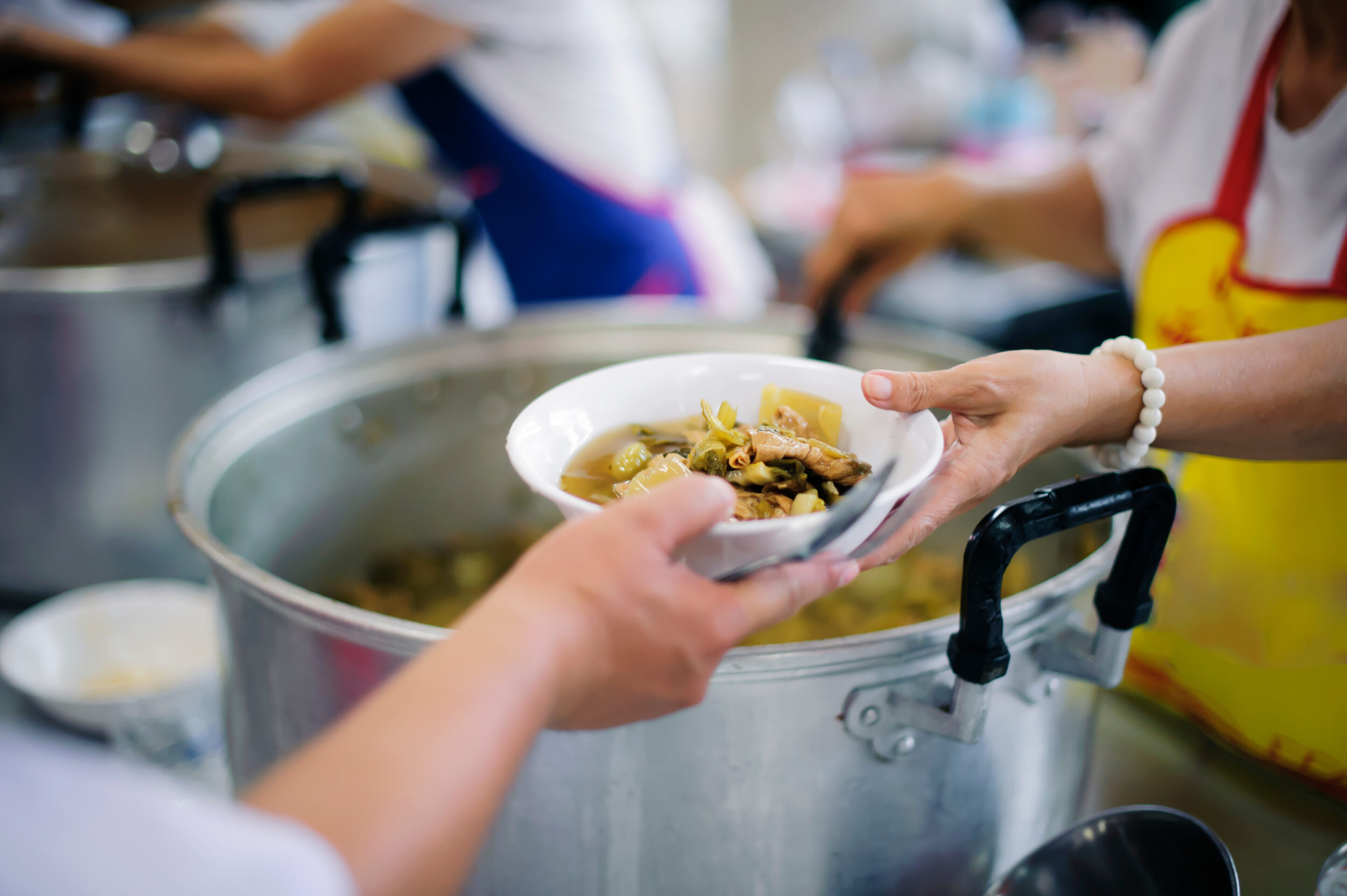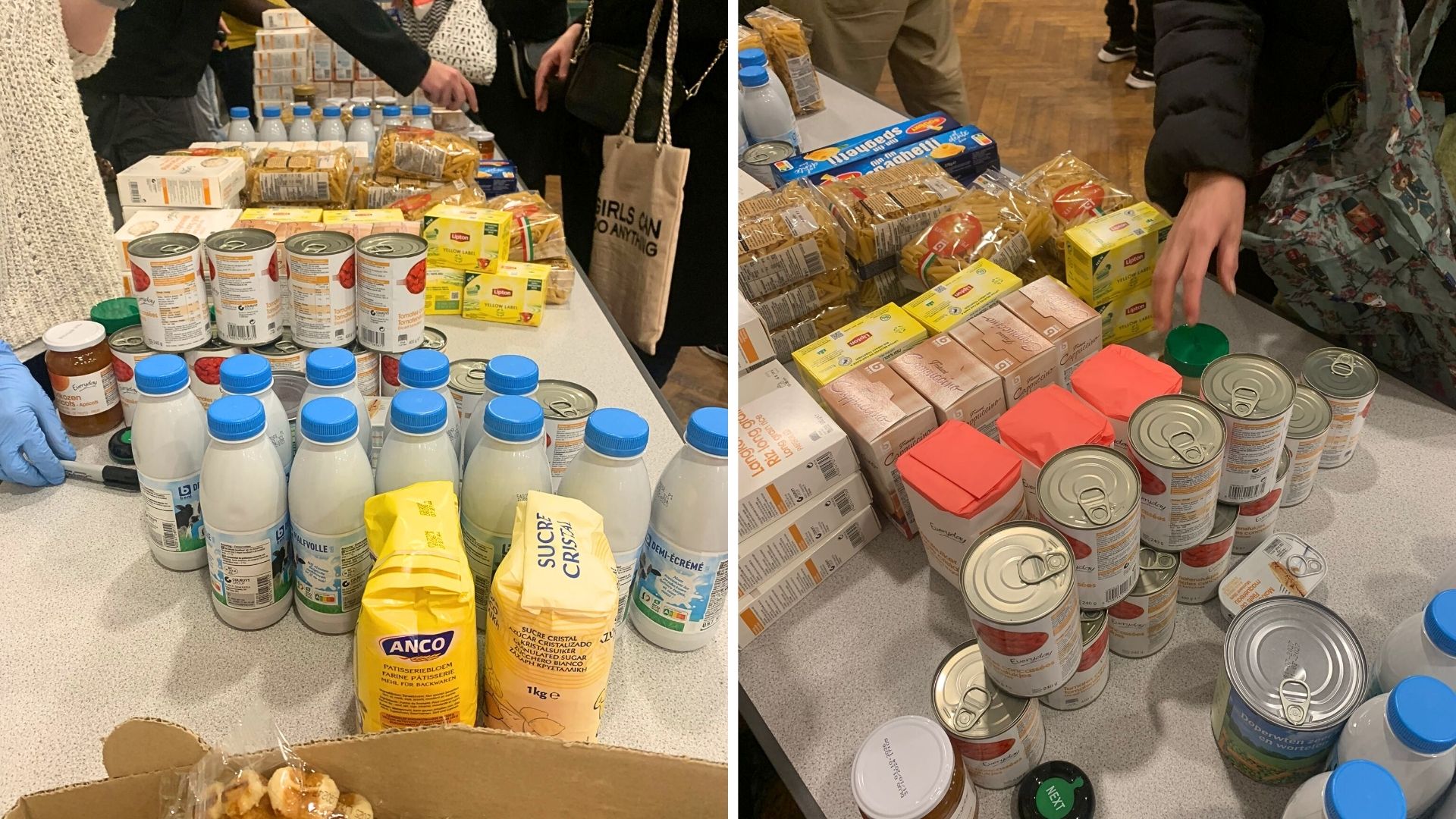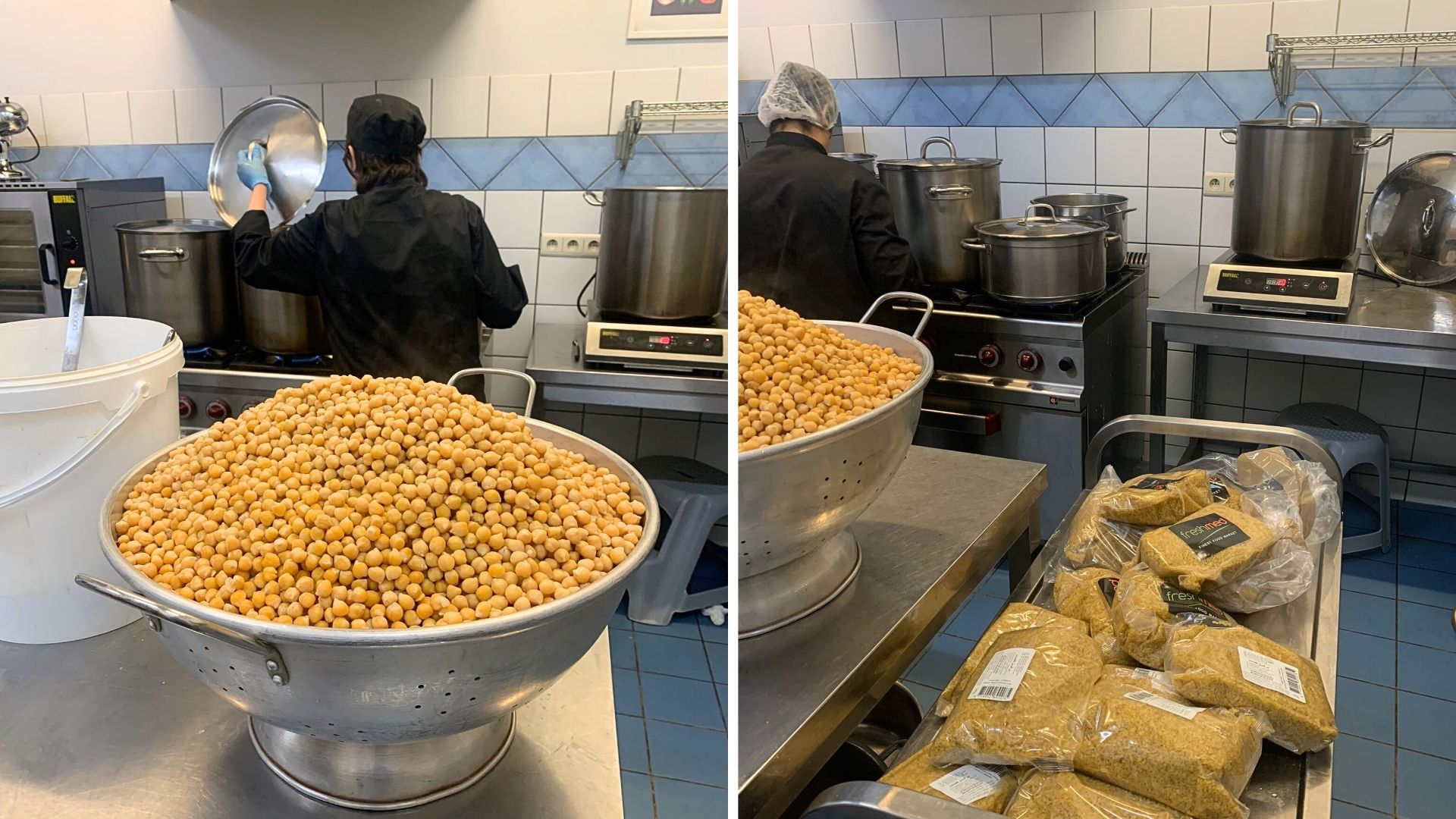In a city known for fine chocolate and high-stakes politics, another reality unfolds in a church basement, where sardines are gold, Nutella is a luxury, and food bank volunteers often queue for their own rations.
In the basement hall of the Holy Trinity, an Anglican church just off Brussels' well-heeled Toison d'Or area, Lola calls out numbers on an electronic counter. At the tail end of this day's food distribution, the counter blinks '80' as still more than a dozen individuals – mostly migrants – wait patiently on foldable chairs for their number to be called.
Lola is business-like and efficient, and she’s also one of the nearly 100 people who turn up every week at this food bank and soup kitchen in Ixelles, run by the charity Community Kitchen. Lola both helps out and takes a bag of essential food items home with her.
“Working at the food bank is helping raise my spirits,” she says.
Lola was previously a hairdresser, but she had to stop for health reasons. She found out about the facility through a public sector debt service and insists that the minimum income guaranteed by the State (often referred to as 'minimex') has not kept up with the sharp rise in food prices over the past few years.
“Some items are almost twice as expensive. More and more people are finding it very difficult to get by.”
Lola says she hasn’t told her two children – also hairdressers – about her connection to the food bank, as she does not want them to worry about whether she’s looking after herself (hence her reluctance to share her full name).
Lola, however, is by no means the only beneficiary of the food bank to also volunteer. Chris Guichot de Fortis, who originally set up the food bank in Anderlecht seven years ago, says that around half of those helping out also use the service.
Guichot de Fortis, a semi-retired interpreter who still works for major international organisations like NATO, says the food bank has grown “exponentially.” He suspects this is due to both word of mouth and greater need, pointing to Belgium’s growing number of undocumented migrants.
Social justice
Since its move to Holy Trinity Brussels four years ago, Guichot de Fortis’s food bank has been part of the Community Kitchen charity, which also uses the church premises and holds an AFSCA licence to operate a food bank. However, its origins lie with l’Olivier 1996, a refugee social and legal service Guichot de Fortis founded in 1992.
“The Olivier helps people with their asylum and regularisation claims, as it is everyone’s interest that situations be regularised, but we provide social services as well, and the food bank was originally an emanation of that,” he says. “Feeding people to me is social justice.”
Although they receive some food donations, Community Kitchen buys most of the produce. Guichot de Fortis does the shopping himself, mostly at Colruyt, since he says it’s cheaper than using the wholesale suppliers of restaurants and bars.
Having worked with what he calls “the marginalised” for over 50 years, he says he has a pretty good idea of the items required, though the product line has been refined over the years. Visitors to the food bank can choose six or seven necessities from a stock of around 15 or so items, depending on how much is available that day.
“Sugar, sardines and tea and coffee are items people clearly want. Some articles go faster than others, such as jam and Nutella,” Guichot de Fortis says, though he admits he buys the generic hazelnut spread to save money. “Rice and pasta, milk, the basics are obvious. And people love sardines – they can’t get enough of them!”
Of the food donations they do receive, some can be tricky to manage.
“Sometimes a big company can be catering for 500 people and has 250 kg of lamb chops left over, for example. But, of course, the difficulty is in giving it out before its sell-by date or if it’s frozen, maintaining the cold chain and complying with AFSCA’s rules. It’s complicated, and there’s definitely a place for some entity to better coordinate all of that.”
Pooling resources
The food bank is part of an informal network coordinated by the CPAS/ OCMW public social action centre in Ixelles, which shares information among its members.
“The idea was to coordinate opening times and to make sure there’s a bank open every day of the week; that way we don’t have six food banks on a Thursday and one on a Monday,” Guichot de Fortis explains. “Also, if there’s 300kg of bread available somewhere [bakery chains and supermarkets are common sources], we pass on that news. It’s maximising the use of excess.”
Guichot de Fortis says he is motivated by his Christian faith, which he believes should be demonstrated practically rather than from a pew. He also recognises, however, that all charities share a common dilemma. “As long as we’re feeding people that are hungry, the state can distance itself from that sector, even though you might say that any organised state should supply food to its population. It’s always a Catch 22: the more we do and the better we do it, the more the state can say, ‘we can withdraw,’” he says.
He favours improving coordination between the state and the charities. “We could have the state fund the charities whereby they would become to some extent the agents of the state.”
For now, at least, the Community Kitchen funding for the food bank comes from private and institutional donations.
“The more proactive I am in talking in churches and going into companies, the better,” he says.
Setting up the soup kitchen
Further into the basement hall of the church, the work of the Community Kitchen continues throughout the afternoon. One of its main activities is providing meals for the Humanitarian Hub Day Centre, a facility for homeless people, migrants and asylum seekers established near the Tour and Taxis building in 2020 by several NGOs.
The Hub’s food distribution operation, coordinated by the Red Cross, provides up to around 500 meals twice a day, 85% of which are produced in the Holy Trinity kitchen.
“Before the Hub, food support for migrants and refugees on the streets in Brussels was really disorganised and ad hoc,” says Gayl Russell, a British lawyer specialising in drafting EU legislation and the main driving force behind Community Kitchen as its project director.

Gayl Russell (Left) and cooking and serving in the church basement (Right).
In 2018, Russell began volunteering at a project similar to Community Kitchen called Le Phare, run by Serve the City. The project provided hot soup to around 100 people at a Salvation Army building near Place Sainte-Catherine from a “tiny kitchen,” she says.
“I was thinking, we’ve got an enormous kitchen at Holy Trinity and we’re not doing much with it. We should be doing something like this there.”
After internal discussions in the church, her initiative began in 2019 and produced meals for Le Phare and the social service Sant'Egidio, as well as muffins for Serve the City’s Breakfast for Refugees. The project was conducted with a handful of volunteers who helped out a couple of days a week. It grew rapidly, however, and in 2020 the charity HTB Community Kitchen was born.
Pandemic catalyst
Russell says the pandemic was the main catalyst for scaling up operations, since many places that provided hot meals indoors could not continue as before. The need arose for takeaway meals that could be given out on the street, and Community Kitchen was increasingly asked to supply meals for Serve the City and Platforme Citoyenne’s food distributions.
The Hub reopened in September of 2020 with a special dispensation to serve takeaway food indoors at its spacious premises, and soon the Red Cross also began to depend on Community Kitchen, “because of all the different outfits around the city that were cooking, we were most organised,” Russell says.
The initiative’s AFSCA licence was also a pivotal factor, since most volunteer-led organisations cannot meet the government agency’s “onerous” food hygiene requirements.
“Having the licence has enabled us to scale up and meet the needs of the Hub,” Russell says. “When we started sending meals to the Hub, we were doing one or two meals a week, and now we do almost seven days a week!”
The Red Cross also benefits from the ease of dealing with one organisation rather than having the “headache” of coordinating multiple different groups, as was initially the case.
Community of servers
Community Kitchen relies on helpers, who volunteer via the Serve the City app called ServeNow, to prepare and portion the food. The meals are mostly vegetarian pasta or rice-based dishes that can be ladled into individual aluminium containers, sealed and then packed into heat-retaining boxes. On average, Community Kitchen now prepares around 5,000 meals a week.
Russell initially coordinated the charity’s production, but a full-time operations manager is now employed along with a full-time kitchen manager. A young Iranian female refugee, whose status was regularised thanks in part to her work at the kitchen, as well as another woman with a similar story, are also employed by Community Kitchen through the CPAS.
In addition to the occasional volunteers who range from students to the retired, the kitchen relies heavily on a core team of around nine people. They are mostly migrants, but there are also some individuals with learning difficulties.
"We've become a community that people come to join and find a safe space, do something useful and have access to food," Russell says.
These volunteers also receive a modest volunteering allowance, which helps them meet some basic needs. Russell believes it is the church’s role to show love to the most vulnerable, and feeding people is at the heart of that mission.
"We're helping people to get through the day, in the hope that if they know they've got a stable source of food, maybe they can then start accessing other services that will help them get their lives back on track," Russell says.
Though the kitchen facilities have now grown to full capacity, the basement hall continues innovating. This year, the team launched Community Café, serving free coffee, cake and soup to food bank visitors. The initiative is in its early stages but still follows the project’s community ethos of “taking care of our neighbours,” she says.
The Humanitarian Hub Day Centre receives no state funding and depends on donations. If you would like to support, visit: communitykitchen.be
Who helps?
- 136 food banks operate in the Brussels region serving more than 30,000 people, according to the foodbank association Banque Alimentaire Bruxelles - Brabant.
- 673 food distribution organisations are active across Belgium serving more than 200,000 people, according to the Fédération Belge des Banques Alimentaires.
- 4,000+ volunteers contribute every year to the more than 40 projects organised by Serve the City; initiatives focus on the homeless, seekers and refugees, the elderly, persons with disabilities, children in need and victims of abuse.



